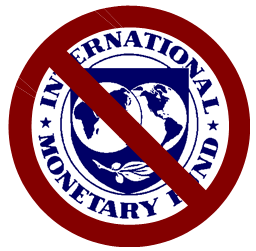
To date, the IMF, which U.S. taxpayers fund, committed a little less than €30 billion of the original €110 billion bailout. Another €50 billion has been also pledged to Portugal and Ireland in the course of the European sovereign debt crisis.
But that does not mean they’ll definitely get the next round of bailouts, right? After all, Treasury Secretary Timothy Geithner recently promised “it’s unlikely you’re going to see the major shareholders of the IMF be prepared to have the IMF play a larger response” in Greece.
So, game over, right? Wrong.
Conventional wisdom, such as from the Financial Times that “important decisions require a supermajority of 85 per cent of votes” or from Reuters that the “United States is the IMF’s largest contributor and has veto power to block decisions”, is incredibly misleading, says Americans for Limited Government (ALG) President Bill Wilson.
If that were true, with 16.75 percent of the vote at the IMF, the U.S. could block a bailout of any country in the world, including Greece. Except, it’s not true.
“It requires a simple majority of the IMF Executive Board to approve lending to any nation, including Greece,” Wilson said, citing research from the Congressional Research Service, Princeton University, and Cambridge University Press.
That means the U.S. “can do nothing to stop more taxpayer-funded bailouts of socialist governments in Europe and their lenders,” Wilson said, adding, “This is why the Pelosi-Reid led Democrat Congress in 2009 never should have approved an additional $108 billion of U.S. taxpayer money for the IMF to play with. But, the U.S. should nonetheless demand a public vote, and Lundsager should vote no.” IMF votes are very rare.
But Wilson said that unless there was one now, “the lack of a public vote will be viewed as tacit approval of bailing out Greece.”
Making matters worse, despite Geithner’s assurances to the contrary, the IMF at its March 13 meeting is preparing to provide between €18 billion and €21 billion of the new €130 billion loan, according to the Wall Street Journal. “Geithner clearly does not have the pulse of a majority of the IMF,” Wilson noted.
However, there is one decision the IMF will be making very soon that does require 85 percent approval, giving the U.S. veto power: Whether or not to reactivate the New Arrangements to Borrow (NAB).
Those need to be renewed at 6 month intervals “by participants representing 85 percent of total credit arrangements of participants eligible to vote and is then approved by the IMF’s Executive Board,” according to the IMF’s website.
The $564 billion NAB, which the U.S. provides $100 billion of, has twice been activated, in April and Oct. 2011. Since the U.S. has veto power over that decision, that means we supported the NAB’s two previous activations, which have already cost taxpayers over $7 billion of bailouts.
To activate it again, members will need to renew it once more in April, with U.S support.
The $7 billion given through the NAB comes atop $22 billion that has been used out of the nation’s $64 billion quota with the IMF. This accounts about 20.4 percent of all current lending by the Fund.
We shouldn’t be providing any of these loans. It may not be able to stop the bailout of Greece, but the least the Obama Administration can do is to demand a public vote, and to direct the U.S. representative at the IMF to vote against it. In the meantime, Congress should be acting to rescind the additional $108 billion it gave to the IMF in 2009 — before it’s all gone.
Robert Romano is the Senior Editor of Americans for Limited Government.






